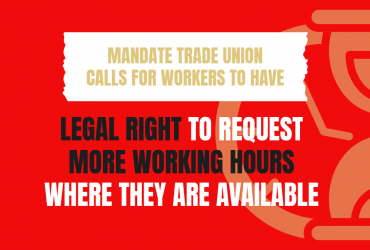International Statement by Esther Lynch, Worker Delegate, Ireland.
Monday 17 June 2013The following is a statement by Esther Lynch from the ICTU to the International Labour Organisation (ILO).
Chairman, distinguished delegates,
One hundred year ago, Dublin was a place of poverty, unemployment, malnutrition and overcrowded housing. The state did little or nothing to alleviate this. Workers and their trade unions stood up to demand better working conditions and to challenge the maldistribution of wealth that was at the heart of their problems. This year Irish Trade Unions are commemorating the courage and vision of working people in 1913 at a time when we are facing difficult times again. A full 100 years on from the 1913 Lockout austerity polices are hitting the poorest and most vulnerable hardest and there are renewed and sustained attacks on workers and their right to collective bargaining through a trade union is not recognised.
On the one hand, Ireland has a very good track record in promoting trade union rights abroad, exemplified by the positive role played by Irish Aid’s programme of support to help unions grow in Myanmar and the important leadership demonstrated by Ireland’s promotion of the ratification of the ILO Domestic Workers Convention as part of it’s EU Presidency. But on the other hand any objective assessment has to conclude that it is a case of ‘do as I say and not as I do’.
Ireland itself has not ratified the Domestic Workers Convention No 189 and rather than supporting unions and promoting social dialogue there has, instead been sustained opposition by those who should know better in politics and business. They oppose all forms of tripartite social dialogue and collective bargaining. Increasingly the legitimate existence of trade unions is questioned anddenied.
These attacks are one part opportunism, two parts ideology and three parts the austerity agenda and its false premise that wage fixing mechanisms, unions and collective bargaining damage competitiveness.
Employers – using the deficit panic – claim that if they are required to respect an employee’s wish to be represented by their union this will drive away business or lead to reduced employment.
Such threats are not new. For over 100 years, opponents of trade union rights have made this claim but, fortunately, economic analysis has advanced and using accurate methodologies economists are proving wrong those who cry wolf about the alleged negative impact on economies when trade union and collective bargaining laws are introduced. Look at the countries in Europe that have weathered the economic storm best: near the top of the list you will find strong collective bargaining nations like Sweden and Austria.
A particularly worrying development has been the series of legal challenges taken by employers aimed at striking down every single piece of law dealing with collective bargaining.The last shred of law protecting collective bargaining was struck down in May of this year. In doing so the Irish Supreme Court characterised the 1946 law for extending collective agreements as giving “rise to the prospect of burdensome restraints on competition for prospective employers and intrusive paternalism for prospective employees.”
Disappointingly, employers do not have to look far afield for more encouragement. Far- reaching and unacceptable changes to Irelands wage fixing machinery and collective bargaining rights have been stipulated by the TROIKA (IMF, ECB and EU Commission) as part of the programme of financial assistance.
The biggest threat to jobs is not unions or collective bargaining, its continued austerity, and it endangers all human rights if employers can claim a veto on the fundamental human right to collective bargaining through a trade union.
It is a matter of grave concern to trade unions in Ireland that despite the State’s solemn commitment given to the ILO (on foot of the 2011 complaint by the ICTU) to amend Irelands’ law, and give effect to the right to collective bargaining through a trade union, NO visible action has yet been taken. Nor has the independent inquiry requested by the ILO been established.
Saying the right thing is not the same as doing the right thing. The time for nice words is over action is needed now. The ICTU is requesting ILO assistance to ensure immediate action is taken by Government so that legislation is enacted to require employers to respect the right of workers to collectively bargain through their trade union.
This is the worrying backdrop into which the Director General’s Report ‘Towards the ILO centenary’ is placed. The Report shows that social dialogue and collective bargaining play an essential role in stimulating economic growth and in addressing the economic inequality damaging to working families.The centenary initiatives he proposes are full of potential to make real and lasting changes in the lives of working people.
I would like to respectfully make a recommendation that the Advisory Panel on the Future of Work would ensure that opportunities are created for workers to give evidence, share their experience and their ideas about the future of work. Unions are ideally placed to create forums for engagement and involvement with the panel, especially with young workers, migrant workers, unemployed workers, workers with disabilities, the undocumented and others who without strong interventions are threatened with disadvantage or stigma, poverty pay and unfair employment in the workplace of the future.
Ends





